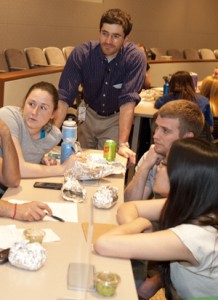
David Levine’s first job after earning a bachelor’s degree from Pomona College in Claremont, Calif., was teaching high school chemistry in the Chicago Public Schools.
At the same time, he earned a master’s degree in teaching. By his second year of teaching, he was made chair of the science department. It was a natural fit for his compassion for the underserved and vast organizational and administrative skills, so it was a tough decision to leave it for medical school, he says.
“I thought I was being very effective in my classroom, but I wanted more tools because so many of my students were so sick all of the time, and I thought medicine was a good answer to that,” he says.
Levine, who will graduate May 18 with a medical degree from Washington University School of Medicine in St. Louis, plans to go into primary care to work with the medically underserved.
Although he is headed to New York University in July to begin a residency in internal medicine-primary care, he gained extensive experience while at WUSTL. Working with uninsured people or those with limited access to health care in St. Louis, he developed health screenings, taught nutrition education and interacted with high school students.
“Dave is a consummate people person — gregarious, extraordinarily gracious and caring,” says Will Ross, MD, associate dean for diversity and associate professor of medicine. “He is also remarkably sensitive to the plight of the medically underserved and has the humility to treat such groups with the proper dignity and respect.”
As a medical student, Levine created several new community outreach programs and brought existing programs under one umbrella.
“It’s a testament to the openness of Washington University that they gave me a budget for what I wanted to do and said ‘Go with it,’ ” says Levine, a self-labeled environmentalist who rides a bicycle instead of driving a car, even to rotations at a Chesterfield, Mo., outpatient center.
Levine coordinated health screenings at local grocery stores, serving more than 1,000 individuals each academic year.
“It’s good to let someone know they have high blood pressure, but unless you have patient follow-up afterward, it doesn’t do any good,” he says. “So we have someone navigate patients to a primary-care home, then later, we call them to find out if they had made an appointment or need to find a different clinic.”
Levine also established four-week nutrition courses at community centers and churches in medically underserved areas of St. Louis. The program works with parents and children separately and teaches a basic curriculum tailored to their needs. At the end of each session, the families come back together to eat and discuss what they’ve learned.
Levine worked with Natalie Villafranco, also a graduating medical student, to establish the Health Professions Recruitment and Exposure Program (HPREP), a branch of a national program in which medical students from underrepresented groups visit high school classrooms in underserved areas to show students that science is fun and to connect them with summer opportunities.
Levine was also a major force in the Saturday Scholars Program, a four-week anatomy course for high school students taught by Ross.
“David was a class favorite, unequivocally one of the most organized, enthusiastic and engaged teaching assistants we have had in the program,” Ross says. “Through his participation in student selectives, he developed a quick grasp of complex population health models and a formidable knowledge of public health.
“He has gained considerable understanding of how to design and evaluate community-based public health intervention projects and consequently will continue to impact the lives of communities locally and globally.”
Levine already has worked internationally. He spent six months in Ecuador while an undergraduate doing field and independent study and, this year, spent a month in Thailand for an elective rotation in infectious diseases. His wife, Eli Margulies, a natural-foods chef, went along to study with Thai chefs.
Although Levine will be spending a lot of time with patients in the next three years, don’t count on him staying out of the classroom forever.
“I hope to be able to combine my passions for teaching and medicine in some way,” he says. “I don’t have a great grasp of it yet, but that’s another reason why I’m so excited about NYU because they are leaders in not only medicine but also social medicine.”